#African Pantheon
Text
child of anansi child of athena battle to the death. who wins
#trick question BITCH. they quickly realize their seamless drift compatibility and form an unbreakable warriors bond. and theyre also in love#percy jackson#anansi#anansi the spider#pjo#heroes of olympus#pjo verde#athena#greek pantheon#ghanaian pantheon#west african pantheon#african pantheon#am doing research and it is v cool#thinking about them… (multiple different pantheons as a reflection of humans in their respective eras and areas)#my shit
2 notes
·
View notes
Text
La Musica e Vita
Sign O’ The Times (2020 Remaster) by Prince https://www.shazam.com/track/5173113/sign-o-the-times?referrer=share
View On WordPress
#African Diaspora#African Pantheon#Cosmic Thing#English as a Second Language#ESL#giallo#la Musica e Vita#la raza#la source#la vita e Bella#Los Misterios#Noir#Orishas#Pan African#Pan American#practice English#Q#Quelle
0 notes
Text
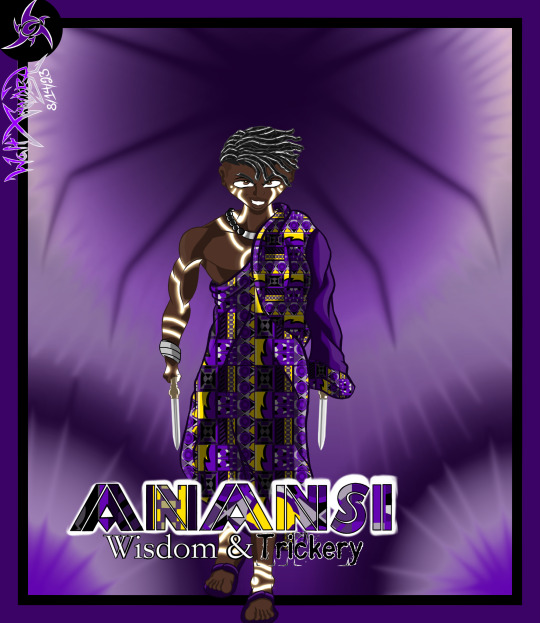

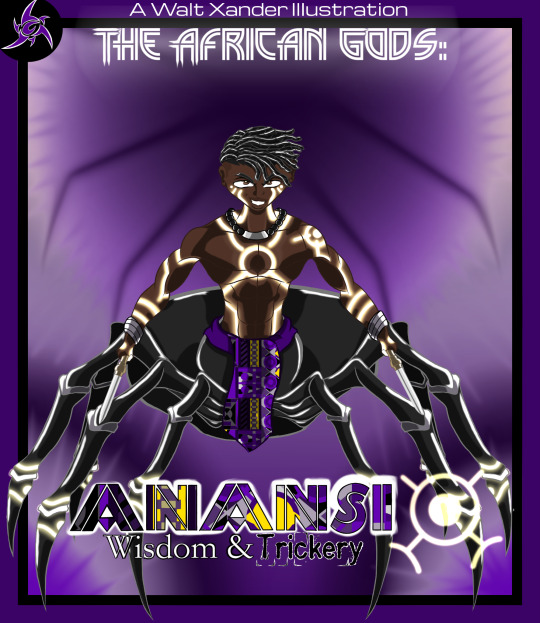
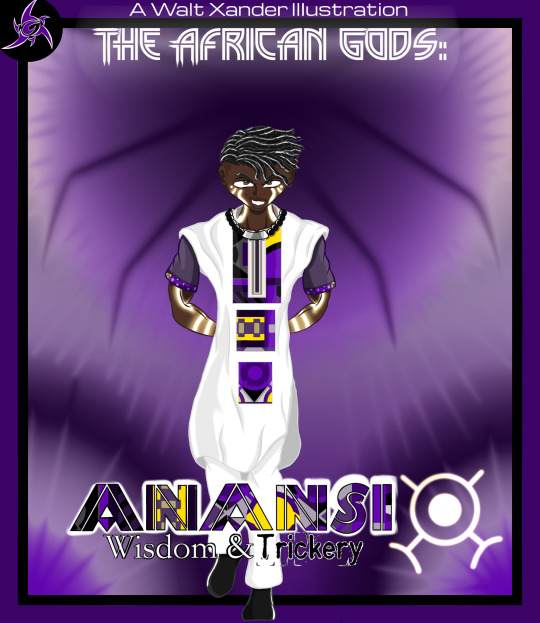
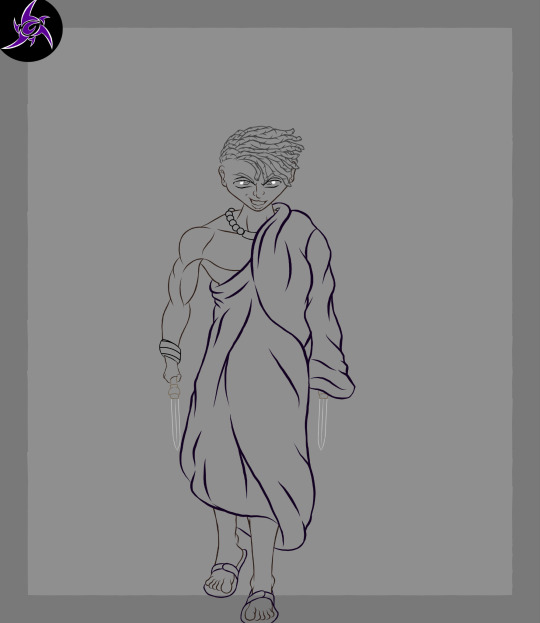
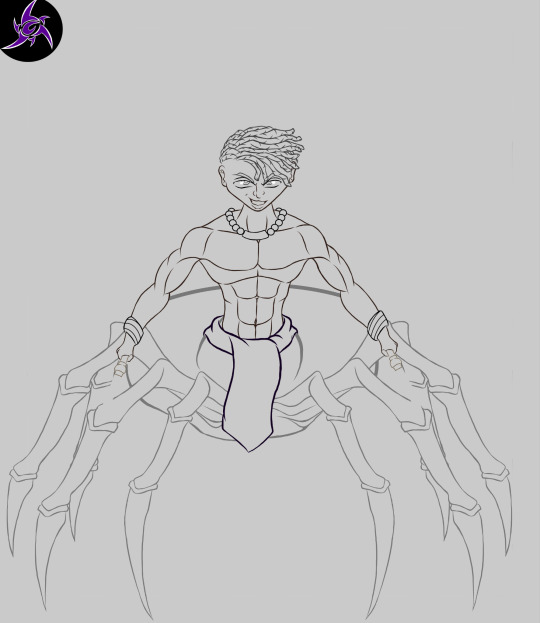
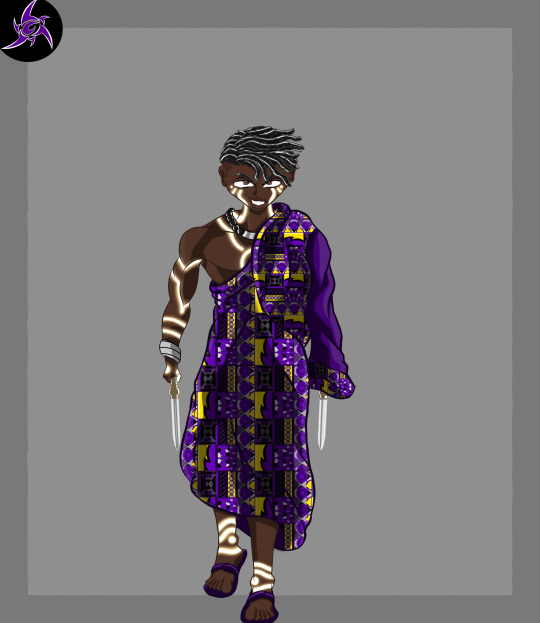
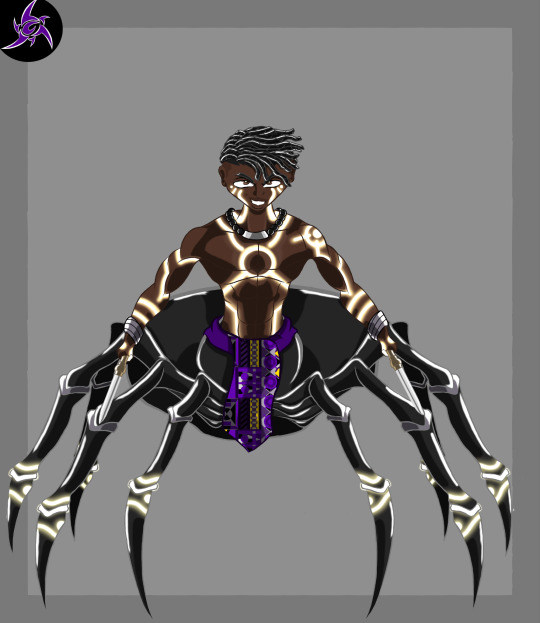
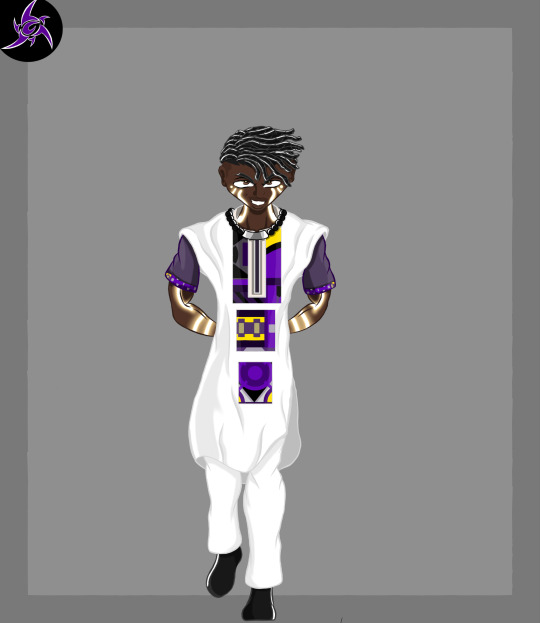
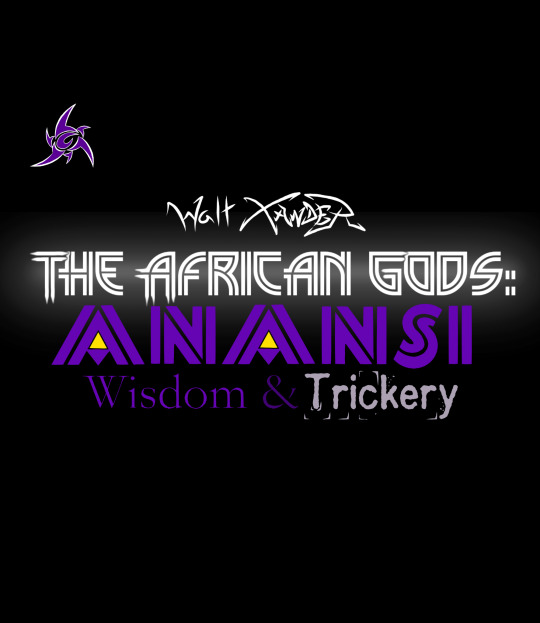
New Classics Challenge
Another African God, this time Anansi. Basically Africa's Loki. A god of stories, wisdom, knowledge & trickery. What he lacks in strength, he makes up for with his wits.
This guy once outsmarted another god, the Sky God Nyambe(that's another African God I'll draw up eventually). He sent Anansi on tasks that seemed impossible, to receive stories in return to give to humans. He didn't think he would actually accomplish those tasks, but he did.
#Anansi#African Gods#African Pantheon#digital art#art#Africa#digital artwork#digital doodle#fyp#Akan#West Africa#Trickster#spider#purple#african mythology#folklore
1 note
·
View note
Text
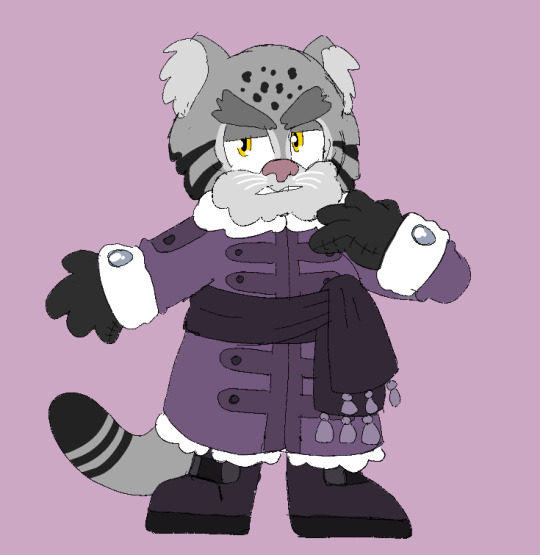
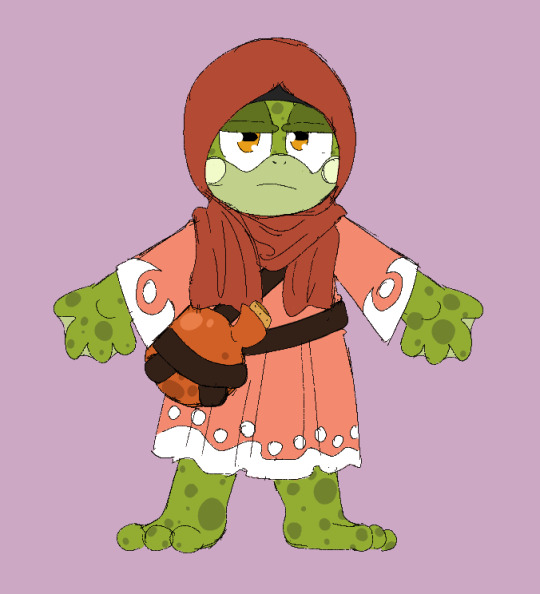
Royal Seer Manas & The Pestilence Witch Malda
Here's more first passes for the Sonic Pantheon AU!
Turns out I'm not that good at making Sonic characters look old, so that's definitely something I'll have to work on in future iterations.
#sonicarting#sonic pantheon au#manas the manul#malda the african toad#sonic oc#sth oc#sonic the hedgehog oc
12 notes
·
View notes
Text
Zeus: Hera did you kill Lamia’s children?!
Hera:

#some say she kidnapped them which is funny bc after that their fate is unknown#one child became an oracle#it’s so funny to me and idk how to explain why#at the gym I used to go to there was a North African girl named Lamia#I don’t remember if she’s Libyan but it would be so funny if she was#greek mythology#ancient greek mythology#greek pantheon#hera#greek goddess#hera goddess#hera deity#hera greek mythology#zeus#hera x zeus#lamia
10 notes
·
View notes
Text
12 African Gods and Goddesses: The Orisha Pantheon | History Cooperative
A vast, diverse continent, religion, and mythology across Africa is rich and vibrant. The African gods and goddesses that make up these belief systems are worshipped in many ways by millions of people around the world.
The Yoruba religion, which is today found throughout Southern Nigeria, forms the basis of many religions practiced by members of the African diaspora. These gods and goddesses are some of the more well-known in Africa yet some of the lesser known by people of the the rest of the world.
A detailed list of all the African gods and goddesses would be endless, but these twelve from the Orisha Pantheon are a good place to start.
Table of Contents
Eshu: the Divine Trickster
Ogun: the Master of Iron
Shango: the Bringer of Thunder
Oshun: the Mother of Rivers
Obatala: the King of Peace
Oya, the Goddess of Weather
Obaluaye, the Master of Healing
Yemonja: the Whisper of the Ocean
Orunmila, the Oracle of Wisdom
Oba, the Flow of the River
How Many African Gods are There?
The Concept of a Supreme African God
Olodumare and his Journey Away from Earth
The Capstone of African Mythology
Important themes
Eshu: the Divine Trickster
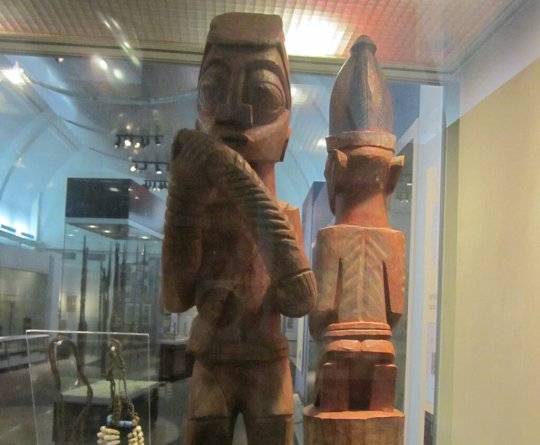
Mischief is something that doesn’t go unnoticed in African mythology in general. Trickster gods are present in many cultures around the world. It is something that adds that bit of extra tanginess to a stew of divine righteousness.
When mischief and trickery can be converted into an orb of power controlled by a celestial spirit, it makes way for a relatively powerful narrative that strikes awe within its believers.
Eshu, otherwise known as Elegba, is the Trickster of the Orisha Pantheon. He is the benevolent version of Loki in African mythology and a wandering trickster spirit generally concerned with probability and elusiveness.
By Western interpretation of Eshu, though, he is not seen as this malicious spirit doomed to destroy humanity through psychological trickery. Instead, he has solidified his position as a messenger between the realm of spirits and humankind, not unlike the Greek god Hermes.
He is not depicted as the devil himself. Still, He is believed to be more than capable of bringing adversity to those that do not take note of his presence. On the other hand, he requires sacrifices of resources such as tobacco to ensure constant appeasement and protection of human spirits
Ogun: the Master of Iron
No settlement can be complete without an armory. An armory provides the means to defend oneself from the dangers of the outside world. This defense was a top priority in a hostile place like West Africa.
And what better tool to carry it out than the trusty old iron?
Being abundant in the region, iron was a vital resource. Hence, the material having a specific personality induced a sense of wonder and natural instinct among those who believed in its smithing magic.
Ogun is the Giver of Iron in the Orisha Pantheon. Alongside mastering the delivery of this world-building resource, Ogun is also dubbed the Warrior God of War. Wielding weapons of fine craftsmanship, Ogun oversees metalwork and conflicts that arise within the Yoruba people.
However, he refuses to interfere in what individuals choose to do with the weapons he blesses the productions of. The destiny of the weapon is left in the hands of the human who possesses it. This is an ode to Ogun’s double-edged sword, representing two sides of justice.
Being garbed in red, Ogun represents aggression in one narrative. Hence, his being is deeply rooted in the Yoruba people’s psychology. As a result, he stands as one of the crucial Orishas in the pantheon.
Shango: the Bringer of Thunder
Modern people often underestimate the might of a crackling burst of thunder. During ancient times, a slap of thunder signaled the onset of danger, or the gods’ wrath hurtling down from the heavens.
In the Orisha pantheon, the supreme god meant existence through Olodumare, and the Yoruba storm god Shango was its bane. Filtering the very essence of wrath and fury, he was the bringer of thunder and brimming masculinity.
Sharing a commonplace with other famous gods such as the Greek Zeus and the Norse Thor, his prowess remained dominant with a chaotic sky. Shango directs the destination of thunder and lightning depending on what goes on in the world down below.
His authoritative use of raw power symbolizes typical masculinity, linking him to a more personal viewpoint for followers of the Orisha pantheon.
This power is often connected to dances conveying threatening gestures in rituals dedicated to this thunderous deity.
Shango has three wives, Oshun, Oya, and Oba. They are all mentioned within this list.
Oshun: the Mother of Rivers
The natural world generally flourishes with life. This wouldn’t have been possible without bodies of water snaking through lush, dense forests, bringing much-needed vitality to all who benefit from it. Nearly every culture associates rivers with something benevolent. After all, they are essential natural resources giving way to life thriving within its banks.
Being the Goddess of Rivers, Oshun is often attributed to being the lifeblood of the Niger River. In fact, her name comes from ‘Orisun,’ which was referred to as being the source of the Niger River. Oshun is also Shango’s favorite wife.
Oshun’s aquatic finesse over the rivers of West Africa immortalized her spot as one of the most critical Orishas. Her blessings ensure that the water remains clean and fishes remain plenty, giving the people a peek into her somewhat empathetic side.
This empathy also means that she is associated with fertility and childbirth. She is strikingly similar to Dionysus, the Greek goddess of wine and fertility. Being involved in marine affairs also implies that she is engaged in rejuvenating the human mind, further solidifying her position. In the Americas, Oshun is regarded as the ‘Orisha of Love.’
However, one thing is for sure. Whichever way she is depicted, she is always shown to be a motherly being with nothing but divine power at her fingertips.
Obatala: the King of Peace
While many Orishas are imaged through physical manifestations such as lightning or rivers, some are connected to deep human affairs. Peace, honesty, and creativity are just some of them.
Garbed in white, the King of Peace Obatala is a merciful Orisha dispatching purity. He is often noted as being the master behind shaping every child when they are within the womb.
His symbols include a white dove and, in more modern times, wreaths of olives due to them becoming a universal sign of peace. Obatala practices a more specific approach to humankind, taking deep care of their psychology while enforcing justice within their affairs.
Oya, the Goddess of Weather
Good weather brings peace to mind momentarily. A great, lasting one makes way for a civilization to flourish. Crops may live or die due to changes in the skies above, and stomachs may be quenched for hunger or thirst. Weather is a fundamental aspect of any significant settlement.
Oya is the Orisha of the weather. Defined as an embodiment of wind, she is Shango’s wife and hence the direct caterer of his will. Besides shifting the clouds, Oya is also connected to tending to the dead. The ‘dead’ doesn’t just include a human being; it consists of the natural world in the sense that dead trees would have to fall to make way for newer ones. Her Slavic god counterpart in Slavic mythology would be Stribog.
So, in reality, Oya really is the goddess of change. Like the weather’s unpredictability, she also commandeers the essence of constantly changing the natural world so it may continue flourishing. Due to this, she also holds domain over psychological qualities such as intuition and clairvoyance.
Obaluaye, the Master of Healing
The concept of regenerative vitality is crucial to every society. No human being is immune to all diseases; however, when there is a chance to heal, it is always welcomed. This duality of vulnerability to conditions and protection against them makes up the next Orisha.
Obaluaye, also known as Babalú Aye, is the Orisha of healing and miracles within the pantheon. Both revered and feared, Obaluaye is well respected by the followers, and he is said to curse you as quickly as he can heal you. Being connected to places such as hospitals where the borders of life and death are frequently grazed.
Obaluaye is also connected to rituals that promote the cure for illnesses. His healing powers range from epidemics to skin diseases and inflammations. This healing power is said to be catered more toward people closer to death.
Yemonja: the Whisper of the Ocean
The ocean is vast and seldom cruel, and it is impossible to predict what lies beneath deep waves and endless stretches of water. Such is the need for a motherly figure to watch over all the uncertainty of this blue domain.
Yemonja is the Orisha of the ocean. Not only does she hold control over it, but she also radiates the power of compassion and love. Her watch over the seas sustains life as it is and seals her importance as a motherly figure in the pantheon and the entirety of African mythology.
Speaking of which, Yemonja is the metaphysical mother of all the other gods in the Orisha pantheon. Hence, she is much revered and respected.
Orunmila, the Oracle of Wisdom
The concept of destiny is gazed upon in awe by all those who truly place their faith in it. Destiny is an important notion to believe in because it continually shapes the lifestyle of the individual who lives in its belief.
Orunmila, the Orisha of knowledge, omniscience, and wisdom, is the embodiment of destiny. His purpose might not be material, but it is a psychological one reflected in many African myths.
Human spirits exist within the mind, and hence, tending to its development is what Orunmila really does. He holds power over knowledge, including information, intuition, and instinct. General African myths deal with confusion by introducing a force that counters it. Orunmila is a prime example of it.
His role also extends to the natural world as he knows everything that takes place within it.
Oba, the Flow of the River
Orishas, too, have emotions that flow gracefully like the river. Oba, the Orisha of water and manifestation, is no exception to a story that is best linked to jealousy.
Being the third and the most senior wife of Shango, Oba was one of his consorts. In the pantheon, Oshun was Shango’s favorite wife, which greatly affected Oba. When Oba asked Oshun about what she did to become Shango’s favorite, Oshun simply lied to her (knowing Oba’s children would inherit the kingdom). She said she once cut off her ear, turned it into powder, and sprinkled it into Shango’s food.
Driven by the will to become Shango’s favorite, Oba followed Oshun and sliced off her ear into his food. Naturally, Shango noticed a floating ear in his food and exiled Oba from his abode.
Oba fell to Earth down below and morphed into the Oba river. Interestingly, the Oba river intersects the Osun river at an explosive speed, symbolizing a long-standing rivalry between two of Shango’s wives.
Oba is linked to rivers, marriage, fertility, and restoration.
How Many African Gods are There?
The pantheon of Orishas (traditionally followed by the Yoruba people) is a sequence of divine spirits dispatched by the supreme god Olodumare.
Though a specific number can’t be placed on the amount of Orishas, there is an exciting notion around it. It is said that there are 400+1 Orishas, where the ‘ stands as an incomprehensible number that implies infinity.
There isn’t an exact number, but sometimes it goes up to 700, 900, or even 1440 Orishas. As for the “400+1” concept, the 1 is an incredibly sacred number that tells you that there are countless Orishas, but you will always be one count short if you try to comprehend it.
So you may think about the total as often as you like, but there will always be one more Orisha to consider.
And yes, this does go on forever.
The Concept of a Supreme African God
In African Mythology, the Yoruba people very well received the notion of an omnipotent sky god looking over all things that live on Earth. In fact, it takes the form of Olodumare, a celestial being that transcends the boundaries of space, time, gender, and dimensions.
Olodumare is also known as Olorun, which means “the Almighty.” Although his omnipotence strikes a profound sense of existential authority, the Yoruba people do not have any dedicated shrines or places of worship for him. Part of this is due to the belief that Olodumare is so deific; his mere distance from the human world makes him incredibly detached from their daily affairs.
Olodumare and his Journey Away from Earth
The Lord of the Heavens was not always this distant from the planet riddled with human beings.
It is believed that at one point in time, Olodumare was close to Earth. However, the constant need by human beings for basic things from the sky, such as food, seemed to frustrate him, so he began his journey away from the planet. Since his abode was the skies, he separated them and himself from the Earth and hence controlled the world from a cosmic distance.
It is here where he found the need to create the Orishas. As the emissaries of his power and will, the Orishas were each assigned unique functions, ensuring total order within the planet of Earth.
The Capstone of African Mythology
Most African traditional religions are extraordinarily diverse and range over countless cultures and practices. The Yoruba religion and its beliefs influence human life in both the African continent and other regions.
The Yoruba religion can be marked as a capstone of African beliefs due to its wide acceptance. Of all the African religions, this remains one of the few on the rise. In present-day Nigeria, Yoruba mythology has evolved into a faith where its followers address the gods and goddesses in respect to the complex oral traditions passed down from generation to generation.
The Yoruba people refer to this religion as Ìṣẹ̀ṣẹ. The word itself can be broken down into two parts;”’Ìṣẹ̀” means’ origin’ and ìṣe refers to “practice.” Coming together, Ìṣẹ̀ṣẹ literally means “practicing our origin.” As you can see, this is a beautiful way to honor their roots, as most of their traditions and beliefs spring from their deep-rooted faith in the Orisha Pantheon.
Important themes
A relatively common theme integrated into the Yoruba religion is Animism. Animism refers to the belief that everything (and yes, LITERALLY everything) possesses a spiritual quintessence. Due to this, every object (material or immaterial) is believed to have some sort of sentience.
As a result, they are all controlled within the domains of the Orishas. Like the gods and goddesses of Ancient Egypt and Rome, there is always a supreme being keeping watch over all.
Another belief revolves around reincarnation. The belief in reincarnation is linked to ideas from their ancestors. The notion of reincarnation is that deceased family members make their journey back to life as a new baby in the same family they once departed from.
As a direct result, Yoruba people can sometimes be identified as their departed imprints through visions and likenesses in appearances. To honor this, they are often given names such as “Babatunde,” which means “father returns” or “Yetunde” (mother returns).
These reincarnated figures are usually there to assist their progeny with everyday life and general faith. Hence, dead ancestors remain as relevant as they can ever be even after death.
Additional Resources
The Orishas, https://legacy.cs.indiana.edu/~port/teach/205/santeria2.html.
Dialogue Institute. “Yoruba.” Dialogue Institute, Dialogue Institute, 16 Sept. 2020, https://dialogueinstitute.org/afrocaribbean-and-african-religion-information/2020/9/16/yoruba .
“Home.” Staff – Works –, https://africa.si.edu/collections/objects/4343/staff;jsessionid=D42CDB944133045361825BF627EC3B4C.
2 notes
·
View notes
Text
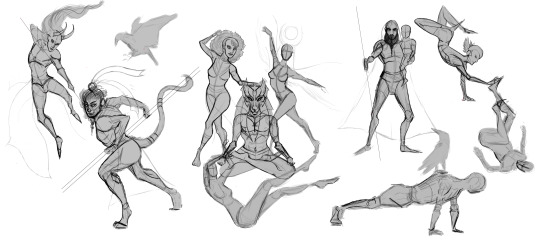
Various gods and humans doing things for my Gods Are Real idea, work in progress.
Left to right. Loki And Wukong fighting, Huginn dive bombing Wukong, Anubis meditating while three drunken goddesses dance around him. Oshun,Isis and Hathor falling over at bottom. Odin with a boy, Mixcoatl doing press ups while Muninn annoys him. And Hermes poking/slapping his pet human who has a virtual reality headset on.
#gods and goddesses#gods#myths and legends#mythology#mythology art#norse mythology#chinese mythology#african mythology#egyptian mythology#aztec mythology#greek mythology#norse pantheon#norse gods#greek pantheon#greek gods#sun wukong#wukong#loki#mythology loki#loki art#odin#huginn#muninn#hermes#oshun#yoruba#anubis#hathor#isis#mixcoatl
4 notes
·
View notes
Text
We Need To Talk About Danny's Power Level.
I was hesitant to make this post, but the more I think about it and the more I see... We really HAVE to discuss this. Generally speaking, I really don't want to be seen as someone who is trying to ruin people's fun within this fandom. I want to inform, and while I have issues with some of the very prevalent ideas in this fandom, I don't want to tell people what they should or should not be making! I want people to follow what they find fun to create! But this power level thing...? I think that it has some rather concerning implications to it that need to be examined and discussed! This is an actual, decently serious problem, and after considering it for a time, it occurs to me that I may be one of the few people in this community that recognizes this issue as an actual issue and has the authority to speak on it...
You NEED to stop making Danny so incredibly overpowered in the DPxDC space.
Now please don't misunderstand me. I understand the value of a good fun power fantasy and making Danny more powerful than God can be fun and cathartic if you have a negative history with the Christian faith. But this insistence on the Ghost Zone being The Most Important Thing Ever and Danny being The Most Powerful Entity Within It is actually actively warping how people interpret and think about DC canon as well as certain characters within its canon to the point of unrecognizability as well as robbing characters of what makes them interesting, the point of their stories, and their agency within it. But most importantly of all, all of this is just... Generally, genuinely dismissive and shitty towards most religions, cultures, beliefs, and faiths that people practice, ESPECIALLY the faiths of POC and other minorities. And this is specifically an issue that DC does not have and that people within this space are making an issue by refusing to let the Ghost Zone and Danny have some limitations.
So that you understand where I'm coming from, please understand that I'm a person of color (I'm half Filipino) and that I'm Buddhist (a religion that I decided to convert to and embrace after a lot of thought and soul-searching, even if I'm not very good at practicing it). It also needs to be stated that in the DC universe, all religions and faiths are true and real at the same time, and they all have more or less equal footing as any other faith or religion or mythology explored in this multiverse. Christian heaven and hell are real. Reincarnation is canonical to the DCU. The Greek Pantheon is real and they are just as real and powerful as the Norse Pantheon. (By the by, just to let you know, yes, people in the real life modern day do actually actively worship both of these pantheons today.) Different alien planets have different faiths, and there is precedent for them being real as well. (Hey! Fun fact! Kryptonians are polytheistic!) It does seem that some form of animism is real within the DCU (within concepts of The Red and The Green)! And there is even representation for indigenous African faiths and beliefs within this shared universe! One of the genuinely wonderful things about the DC universe is that all of these faiths are real, they're all valid, and they are all more or less on equal footing to one another! If all the religions and afterlives and gods of each pantheon went to war with one another, it would genuinely be difficult to know who would win, or who would even stand a chance of coming out of this conflict alive!
In fact, a lot of characters and storylines within the DC universe are actually DEPENDENT on all of these faiths existing and being equally valid at the same time. Do you know where Billy Batson gets his powers from? The phrase "SHAZAM," if you didn't know, is actually an acronym for the names of the gods and heroes that he derives his powers from. (Solomon, Heracles, Atlas, Zeus, Achilles, and Mercury.) And it's implied that each person with SHAZAM powers has different heroes and gods that they derive their power from! (Black Adam derives all of his powers from the Egyptian Pantheon. Mary Marvel derives all of her powers from female gods and heroic figures.) Many of Wonder Woman's stories involve her interacting with various different pantheons. Xanthe Zhou gets their powers from traditional Chinese folk ancestor-worshiping practices. Ragman is a Jewish character whose suit is a powerful Jewish artifact- a suit made out of the souls of sinners that was created to protect the Jewish community. Sun Wukong is an actual character in the DCU and he is JUST as overpowered and immortal ×500 as he should be! And there are like... At least 3 entirely different characters that either are iterations of, claim to be, or pull their powers/inspiration from Anansi! DC celebrates a lot of faiths and religions and are bringing in more beliefs and faiths into their universe all the time! TONS of characters derive their powers from their religions, faiths, and beliefs! And DC celebrates them all as being real and valid to all who practice them! ... And you want them all to be forced to be under the same umbrella and less important and powerful as Danny and the Ghost Zone...
Bringing up ideas of ghosts and afterlives are always going to be loaded subjects because they often inherently rub up against actual living people's practiced religions and beliefs. But a belief in ghosts and dimensions better suited for them is also a valid belief that real life people have. And there is precedent for these beliefs also being real within DC canon. But DC only manages to get away with crossing over as many faiths as it does by saying that they are all real, valid, and while you might see less of some pantheons and more of others, they all exist and are doing their own thing just like they do in real life, just off panel... Are you beginning to see what the problem is...?
In the DPxDC fandom's eagerness to incorporate Danny into the DC universe and to make him powerful enough to go toe to toe with the likes of Superman, it seems that most people immediately overcompensated and that no one has really thought to slow down, stop, and actually think about what they are implying. Because the most common headcanons that I have seen regarding the Ghost Zone and other afterlives and religions? It's that they are all parts of the Ghost Zone, but are all ultimately subordinate to it. And since Danny is the Most Powerful and Important Person in the Ghost Zone... This implies that all religions, faiths and beliefs are less important and are indeed subordinate to the Almighty Danny. That all deities and the people following them should just bow down to Danny's might. This is something that DC, in spite of all of its flaws, has managed to avoid. These religions are REAL religions! Actual faiths practiced by actual people! We are NOT talking about dead, irrelevant pantheons that no one alive worship anymore! We are talking about living, active faiths and religions, some of which colonizers have tried to eradicate from the world! Some of these faiths have been suppressed! Some of the people who practice these beliefs have faced genocide for them! And so saying that the Ghost Zone is bigger, better, and that Danny is more important than any single other faith and afterlife...? THAT'S A SHITTY THING TO DO! You are literally doing the shitty Christian missionary thing, but with a fictional afterlife that consists of fictional characters that you know are not actual religious beliefs! You're landing on the sandy polytheistic shores of the DCU and declaring that the Ghost Zone is actually vaster than every faith already in the DCU and that Danny is more powerful and has authority over your gods! That your beliefs and faith and religion should just take a backseat to the Danny power fantasy! That your real, lived religion is not more important nor should it be respected when Danny is in the room! Of course the Buddha should bow down to Danny! Of course the Jewish people should renounce their faith and worship Danny instead because he's better and more powerful than the Jewish God! Why should people pray to their ancestors when Danny ultimately gets to decide what happens to everyone's ancestors!? If they want good things to happen to their ancestors in the afterlife, they should pray to Danny instead! Not like any form of prayer works or matters in this universe anyway because Danny is Almighty! And he doesn't hear the prayers! By making all faiths subordinate to Danny within these stories, you are saying that anyone who practices these beliefs and faiths within these stories are not valid in their beliefs. The only belief that matters and is real in this universe is the Ghost Zone and whatever will appease Danny the most. And while the characters in these stories are not real, the religions, beliefs, and practices they engage in ARE. And so you are implying that real people's faiths and religions don't matter. You are just dismissing real faiths and beliefs as not something worth thinking about or respecting within your works! You are saying that this fictional American white teenage boy and his goopy green land is more important to you than just being respectful of real people's faiths, beliefs, and religions. That your power fantasy is more important than saying that a person is valid for holding on to their beliefs. That when it comes down to it, that you would rather people choose your Danny power fantasy over their religion being portrayed as important and valid. That is honestly insulting. And really alls that you've done is impose monotheism onto the DC universe. You're just enforcing monotheism on people with extra steps. But instead of it being the Christian God, you've put Danny in that position. THIS IS A SHITTY THING TO DO! THIS SHOULD NOT BE THE DEFAULT HEADCANON THAT PEOPLE HAVE IN THIS FANDOM! PLEASE STOP!
Please understand. I know that you didn't do this on purpose or mean to imply this intentionally. I know that you didn't realize that you were insulting and undermining actual faiths and religions by pushing these ideas on the fandom. If one or two people had these thoughts and headcanons and didn't think very much about what they are implying, this would not be a problem. But for this to be the default is VERY disconcerting! As a Buddhist, it does feel genuinely shitty and insulting to imply that Danny has authority over the Buddha and that he outranks and is more powerful than Sun Wukong. It's not fun to think that my beliefs matter to you less than continuing to play with your Danny power fantasy. That you don't think that the pursuit for enlightenment and inner peace is real or worthwhile. That you would find my pursuit of compassion over everything else to be silly, stupid, and laughable when stood next to Danny. I know that you don't mean it. I know that's not what you meant to imply. But it is what you imply by making every faith subordinate to the Ghost Zone. And as someone who has a faith that is so often seen as subordinate to others and just a silly little play fantasy that doesn't matter and isn't real, it's depressing and uncomfortable to see this community as a whole unknowingly echo these sentiments. People in real life don't think that my faith is valid. People don't believe me when I say that I'm Buddhist. And as someone who is Filipino on top of that, I can't help but to think about the utter tragedy of my ancestors being forced to convert to Christianity or die. To forget their beliefs, pretend they never mattered, and embrace Jesus. To be forced to believe that their indigenous beliefs didn't matter. And so many of those indigenous beliefs are now lost and forgotten to their living ancestors (including myself) for it because to the Christians, their belief in Jesus was ultimately more important to them than just letting the Filipino beliefs and religions peacefully exist as they were. It's uncomfortable to me that you would rather I just embrace this view of Danny and let him be more important than and be an authority over my religion. That I should just be comfortable in Danny being more important and better than every religion that people actually practice in real life. That I should just forget the insult to my and any other religion that you make by placing Danny as more important than, and to "just have fun." But I can't. And these ideas are everywhere in this fandom. Even in stories where it shouldn't matter or doesn't need to be present, it's there. This reminder that you don't take my faith seriously- these ideas that Danny is more important than my faith are ubiquitous to this community. An issue that wasn't present in either of the original source materials. Because they thought about it and so went out of their way to not imply it. But here, people are just not willing to make that courtesy for even a second.
But it doesn't have to be this way. You can do better! I know that you can do better. And it isn't even difficult to do! All that you need to do better is to simply... Just... Think about it. When you imply or say "all afterlives are part of the Ghost Zone" actually think about ALL afterlives! Christian and Atheist and Greek ones, yes. But also Asian and Native American and African and South American ones too! Is that kind of thought fair towards Native American faiths, Buddhists, Jews, Hindus, Palestinians, Hellenists, Animists, and every other person and group that practices a faith? Or does this have majorly fucked up implications towards some or all of these people? If the answer is yes, you can proceed, but you need to be mindful of that fact and just think about it, even if only a little. Even if it's just a small acknowledgement that you don't know what you're talking about or that you are choosing to ignore some of the fucked up implications you're making here for the sake of the story in the tags. I just want you to take a moment and think through the implications of what you are making, and to make a choice on whether you should proceed or reconsider things. If you choose to proceed with the fucked up implications, that's fine. It means that you can do so with other mindsets in mind and can possibly use these ideas in interesting ways! At least you made a stance to possibly be shitty towards some people for the sake of your fun. At least you made the choice to say that some people's beliefs just don't matter to your story. This is a neutral statement. Some works of art are just not made for some kinds of people. And that's fine. But it is always better to knowingly acknowledge and make that choice than to pretend that it isn't there. And if you didn't realize that's what you were doing? If you reconsider and choose to turn back on this idea? At least you made that choice and didn't just passively follow the rest of the crowd to get here. Hopefully, thinking about it will make you more mindful about your art in the future and therefore make it better! The only thing to do about it is to acknowledge that you weren't thinking about the implications, but that you changed your mind, and move forwards with your life.
Now just to be entirely clear, I'm not telling you that I want you to feel guilty about being inconsiderate towards other faiths. That doesn't really do anyone any good. I won't get any satisfaction from you feeling guilty about it or internally punishing yourself for it. Just actually give what you might be implying more thought in terms of religion next time and do better. It's alright to make mistakes. We are all just human and we all make mistakes. Sometimes we don't even realize when we've made a mistake. Just strive to do better next time, be more willing to let go of these ideas that you're so attached to, allow yourself to see things from another perspective, and move on. Sometimes, it's better to just leave things alone. Sometimes you shouldn't meddle and try to rework ideas that were perfectly good on their own to begin with. Sometimes nothing that you personally can add will be a positive contribution. Sometimes the only thing that interfering will do is over-complicate things and rob the idea of what made it so interesting and powerful in the first place. But it's okay to leave it alone. It's going to be okay. I'm not angry. Just disappointed and a little frustrated. But it's better if you are able to just drop these things and move forwards with mindfulness in the future.
As an alternative, I think that it would generally be better for the Ghost Zone to just be its own thing separate from the other afterlives. Equal to other afterlives and not all-encompassing of them. It can be connected or related to other afterlives, but being greater than them as a whole is just a very uncomfortable and cruel implication. You don't need the Ghost Zone to be the most important thing in the multiverse. And Danny does not need to be the most powerful thing in existence. Please. It's okay to have power fantasies. But the invincible overpowered stronger than all Gods Danny should not be the overwhelming norm here to the detriment of everything else. It's only when you let go of Danny NEEDING to be the MOST important thing in the multiverse can you start to really dive into some of the more interesting sides of characters on their own terms and not on yours! Like... Did you know that there is one ghost character in DC called The Spectre and that he's the literal personification of the wrath of God? Did you know that Xanthe Zhou as a spirit envoy is actually half dead and half alive? Did you know that The Wizard Shazam is actually, secretly an aboriginal god? Did you know that in the DC universe that Judas Iscariot still walks the Earth to this day, doing vigilante work to atone for his betrayal of Jesus? Did you know that Ra's Al Ghul's mom has met and hung out with some of the demons that Sun Wukong fought against in Journey to the West? Hell, did you know that Damian is Buddhist!? Imagine that. Danny coming in and telling Damian that he's more important and more powerful than Damian's entire religion. That the Buddha is just a lackey of his and that he rules over all afterlives, including nirvana and cycles of reincarnation. I'm certain that Damian would take that very well and accept it wholeheartedly! Don't you agree with me?!!?!???!
I personally think that all of this is better and more interesting if characters, their religions, and ideas in general are able to interact with Danny's world on their own terms without being forced to fit within Danny's box! You don't need to try to force everything within DC's universe to fit inside Danny's. DC wouldn't ask for Danny's universe to conform to theirs! They would just add everything that Danny's universe has to offer on top of everything else they already have! And trying to fit the entire DC multiverse within the scope of Danny's universe... It's too small a box for too large of a universe! Sometimes you can just let things not be deeply connected. And sometimes things don't need a complicated explanation and it can literally just be magic. There's nothing wrong with trying to tie everything together in a neat and succinct way. But sometimes you need to pull your view out a little and look at what you're doing and genuinely ask yourself if what you're doing actually adds depth, or if it does more harm than good and makes everything worse, make less sense, and more complicated or not. It's okay to fall down the rabbit hole sometimes. I completely understand that happening and do it all the time! Just remember to be mindful about it!
Either way, if you're going to insist on desperately clinging onto these ideas of Danny being the Most Important and Powerful Thing in the Multiverse to the detriment of literally everything else, that's fine. But just be honest with what you're doing and why. This isn't a Ghost King Danny AU. Kingdoms don't have unequivocal power over other and all kingdoms. It's a God Emperor over all Gods Danny AU. Nothing wrong with that concept in of itself. Just tag it properly as something like "God King Danny" so that I don't have to deal with it and the implications you're making about my religion with it. That would be enough! I would be happy with that! Just make your choice. Think about what you're doing, why you're doing it and choose. If you choose to keep going, that's fine! All the more power to you! Have fun! But be honest about what you're making. I may not like it and think that it's an overdone, overplayed idea at this point, but you're free to do it! So go forwards and make what will bring you joy! But now that you've thought about it a little, hopefully you'll continue with a little more knowledge and foresight. And hopefully that will make your work even more interesting and better for it! And if you decide to change course, I'm glad that I was able to sway you and get you to see things from my perspective and come to my side on this. At the very least, hopefully this will help to vary up ideas within the fandom a bit and you won't just take ideas that are happening in this space entirely for granted and as givens! I have so many ideas on interesting ways that these intersections can go and characters that you can use, and ways to look at this community that offer so so SO many interesting story directions! I'm so happy that you've decided to come with me on this journey! You're going to make something great, I'm certain of it! So let's make something wonderful together! I believe in you! There's a lot of fun to be had! ^.^
#ghost king danny#dcxdp#infinite realms au#god king danny#dpxdc#dp x dc crossover#dp x dc au#dc x dp#dp x dc#danny phantom x dc#religion#religious discussion#religion tw#religion talk#danny phantom
258 notes
·
View notes
Text
Red Flags In Pagan Circles
I've seen a lot of younger, inexperienced members of the pagan (and witchy!) communities fall into some traps set up for them by people who wish to harm them. It saddens my heart to see this happen, as a lot of newer practitioners join these circles so they can learn! And because they're new, they often get taken advantage of.
So I'm creating this non-comprehensive list of some red flags in pagan and witch circles. Again, this isn't comprehensive. I will be updating this as time goes by, so I recommend checking in on this. For each red flag, I'll give a brief explanation as to why it's a red flag. As always, feel free to add your own in the replies and I'll add them to this post!
EDIT: 11/15/2022 - since there's been some people misunderstanding some of the things in this post, I've rewritten a lot of it so hopefully it makes more sense! Apologies to any confusion that's been caused. I also added some of the additions people have reblogged as well!
Usage of the terms "black" and "white" magic:
While this doesn't always mean someone is racist or xenophobic, within occult spaces there's this tendency to use this. The association of darkness/black things being evil isn't always a racist thing (we as humans are naturally afraid of the dark), but it did play a part in the Atlantic slave trade by associating dark skin with animalistic, evil ambitions and light skin as being pure and good. This isn't 100% a red flag, but it's good to keep an eye out when it is used! Another issue is that "black magic" was often used to refer to African traditional magic. It's why you'll often see hoodoo and voodoo portrayed as evil.
Argues that anyone can practice whatever they want, regardless of the status of it being closed or not:
Closed practices are closed for a reason, specifically because these practices have had their people murdered, their land stolen, and their practices made illegal for many years. The reason they are closed is so that outsiders cannot just come into their sacred spaces, take what they want, and bastardize it. The belief that you can join these closed practices without being initiated/born into them is rooted in colonialism and racism. This is one of the biggest red flags.
Some examples of closed practices are hoodoo, ATRs, Native American beliefs, brujeria, and santeria. Some plants are closed as well, so please do your due diligence.
The belief in folkism/volkism: that open pantheons should only be worshiped by those with their blood:
This is the complete opposite of the above. Open pantheons are open because they have not been passed down to us in a single line, and they are currently being revived. As such, these practices can't really be "closed". People who argue that open pantheons should only be worshiped by those with their blood are partaking in the same beliefs as Neo-Nazis. Please watch out for this especially in heathen/Nordic spaces! These people ARE NAZIS.
The specific dogwhistle here is "go back to your roots". (Thank you to @chrisasiaheartman)
Offers to teach advanced practices (baneful magic, deity work, etc.) to newcomers:
It's true that everyone is on different parts of their practice, and not everyone will progress the same way. However, there are certain practices that newcomers should not be doing until they have the basics down. This includes baneful magic and deity work, as you can open yourself up to disastrous consequences if you don't take the proper precautions. This isn't too much of a red flag as often the people doing this do mean well, but it's still something to look out for.
They use the terms "witchcraft" and "Wicca" interchangeably:
They are not interchangeable! Witchcraft is a practice, and Wicca is a religion. These types of people often believe you must be Wiccan to practice witchcraft, which you don't.
They refer to Wicca as an "ancient" religion:
This is false. Wicca was founded in the 1960s. If they do this, it could either be tongue-in-cheek, or it's just blatant misinformation. I would be careful.
They act as though baneful magic is evil.
It isn't. Baneful magic can be a form of protection and self-defense, it is not always a bad thing.
They act as though the "threefold law" is the end-all-be-all of practicing:
Not every witch believes in the threefold law, nor are you required to. This goes back into my point about them believing you must follow Wiccan teachings to practice witchcraft. You don't, period.
The use of racial or cultural slurs, even if they claim it's in a non-discriminatory way:
They are racist. If they're mentioning these slurs in an educational way, that's fine. But if a witchcraft space is just dropping these slurs casually in speech, it's a good sign of them being racist.
They push a specific diet:
You don't need to eat vegan or vegetarian to be a witch. No one has to. Some witches might think that's the best way to practice, and that's fine! Some witches might not subscribe to that idea, and that's fine too!
They push pseudoscience and/or anti-science ideologies (anti-vax, etc.):
This is extremely dangerous. Witchcraft and science can work together just fine. People have done this for so long, and pushing these ideologies can be extremely dangerous to peoples' personal health.
Enforcement of gender binaries:
This is things like the divine "masculine" and divine "feminine". Often times these people will also claim that the womb/uterus should be worshipped as well, and the people who do this are often TERFs/transphobic. Not everyone neatly fits into a gender binary. (Thank you to @hagstone-enthusiast for this!)
They promote the idea that only witches can be female, or that male witches are called warlocks:
Witches can be any gender, and the term warlock is actually derogatory as it means someone broke their oath.
Promotes the idea that mentally ill/neurodivergent witches that that way because they have a strong intuition:
This is very dangerous because being neurodivergent/mentally ill isn't a special thing, and it often is a detriment to many people. People who claim this often believe in indigo children/starseed children. In addition, look out for people to claim that neurodivergent people are that way because they "don't have a position attitude" (thanks to @urchinbeans5000).
2K notes
·
View notes
Text
"Let's make games and media about other mythologies and pantheons other than Norse or Greco-Roman" is a take I really, really get, but the unfortunate reality is that most Western media conglomerates are pretty culturally white, and can you imagine the appropriation shitshow that would result from them portraying indigenous mythologies instead of the two pantheons that people can at least somewhat ascribe to Western European tradition? Ancient Egyptian seems the next most "safe" due to cultural penetration and time remove, and even that sparks discourse when it's done. Honestly I'm surprised that Disney even mostly got away with Moana, and that hardly went without critique. I think the execs that don't want bad press are well aware of this and are afraid to wade in.
I mean the obvious answer is for them to just hire people who can boast more claim to the tradition in question, but unfortunately it doesn't tend to work that way en masse, and also, even if they did do that, there would be a continent who would complain anyway. Own narratives are frequently called out as bad rep, usually by people who don't know the provenance (but sometimes even when they do!), and it'd be even worse with a big corporate name from the west attached.
Anyway buy foreign art I guess, but under current trends the big multi-billion God of War equivalent about African tradition is unlikely to come soon, I guess. Kind of an unfortunate side effect of the representation and appropriation discourse that makes certain kinds of narrative more scarce.
(A possible exception to all this might be, for instance, Japanese spiritual tradition, as there are plenty of Japanese media products that do well in the West. But this proves the point, because for instance I can think of examples of video games and films that feature oni, etc, whereas I can't for the less widespread or internationally exposed traditions that I describe).
79 notes
·
View notes
Text
Hoodoo is CLOSED to non black AMERICANS
Hoodoo is distinct in that it involves working with specific ancestral spirits and deities, many of whom remain unfamiliar to the broader spiritual community. This sacred connection extends beyond mere knowledge; it is an intimate relationship with spirits deeply ingrained in the Hoodoo pantheon. These spiritual entities are closely tied to the experiences of Black Americans, and understanding them requires a profound awareness of one's lineage.
:
Hoodoo is considered a closed practice, meaning that access to its teachings is earned through guidance and mentorship. True practitioners are taught; they don't self-proclaim. Unfortunately, there is a concerning trend of non-Black individuals claiming to practice Hoodoo without a genuine understanding of its essence. Many cannot name a single spirit from the Hoodoo pantheon, exposing a significant gap in their knowledge.
It's crucial to distinguish Hoodoo from general folk magick practices. Hoodoo demands practitioners to delve into their lineage, understand their history, and grow in spiritual wisdom. The conflation of Hoodoo with generic folk magick demonstrates a lack of comprehension about the unique cultural and historical underpinnings that define Hoodoo. Hoodoo requires knowledge of the American slave trade and its affects on black Americans
Ancestral spirits within Hoodoo are discerning entities, recognizing color and lineage. Contrary to the notion that spirits lack prejudice, Hoodoo practitioners assert that ancestral spirits work closely with their descendants. Given the historical context of slavery and oppression, it becomes inconceivable for these spirits to collaborate with those from the very lineage responsible for their suffering.
:
Unlike some other African Traditional Religions (ATRs), Hoodoo has resisted commercialization and exploitation. Its practitioners emphasize the sanctity of their belief system, urging others to respect and protect it. The appropriation of Hoodoo by those outside its cultural lineage is viewed as a disservice to its profound spiritual significance.
:
Hoodoo is not merely a set of rituals; it is a sacred tapestry woven with the threads of Black American history, spirituality, and resilience. The claim that anyone, irrespective of background, can practice Hoodoo disregards its closed nature and the imperative to honor its cultural specificity. It is time to acknowledge and respect the boundaries of Hoodoo, safeguarding its authenticity and the spiritual legacy it represents.
189 notes
·
View notes
Text
Did you know
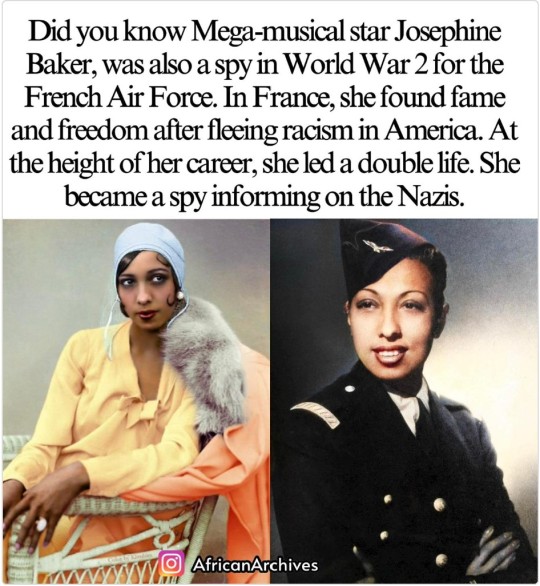
Did you know Mega-musical star Josephine Baker, was also a spy in World War 2 for the French Air Force!
In France, she found fame and freedom after fleeing racism in America. At the height of her career, she led a double life. She became a spy informing on the Nazis.
In 1934 she also became the first black woman to star in a major motion picture.
Her ongoing popularity in Paris in the forties gave her access to parties, embassies and ministries where high-ranking officials gathered.
Rather than simply enjoy her position and focus on her career, Baker used her access to extract valuable top-secret information and pass it on to French military intelligence.
Once the Nazis occupied France, Josephine moved to the South of France and worked with the French Resistance, sheltering refugees and supplying them with visas and other support. Among other ingenious methods, she smuggled military secrets out of Nazi-occupied France and…
Nazi guards were so star-struck by Baker, known in various circles as the "Black Pearl," that they let her slip across the borders with no issue. No one suspected that her sheet music was covered with messages written in invisible ink or that her dress contained hidden…
She had many close calls during her time as a spy, but Baker reportedly laughed off the danger, saying, “Who would dare strip-search Josephine Baker?”
Her work with the French Resistance earned her the Croix de Guerre and the Lègion d’honneur.
Her work with the French Resistance earned her the Croix de Guerre and the Lègion d’honneur.
The National Order of the Legion of Honour, formerly the Royal Order of the Legion of Honour, is the highest French order of merit, both military and civil.
Josephine Baker also became the first Black woman laid to rest in France's Pantheon mausoleum, the storied tomb of heroes. #womenhistorymonth
Source: African Archives
118 notes
·
View notes
Text
La Musica e Vita
Sexual Healing by Marvin Gaye https://www.shazam.com/track/240844/sexual-healing?referrer=share
View On WordPress
#African Diaspora#African Pantheon#Cosmic Thing#English as a Second Language#ESL#giallo#I heart music#la Musica e Vita#la raza#la source#la vita e Bella#Los Misterios#Noir#Orishas#Pan African#Pan American#practice English#Q#Quelle
0 notes
Text
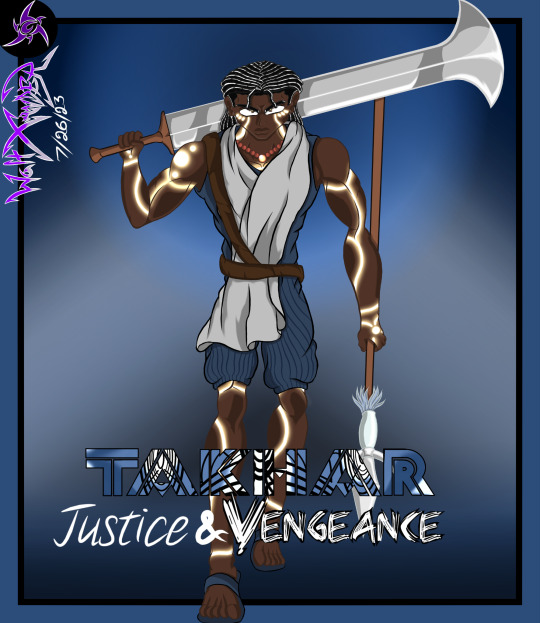
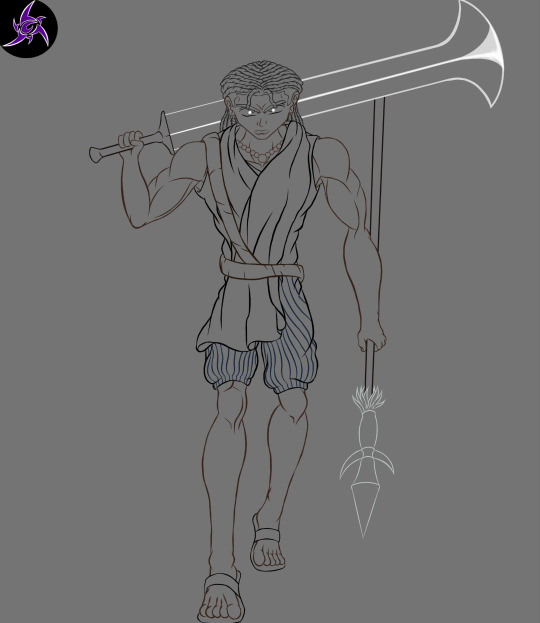
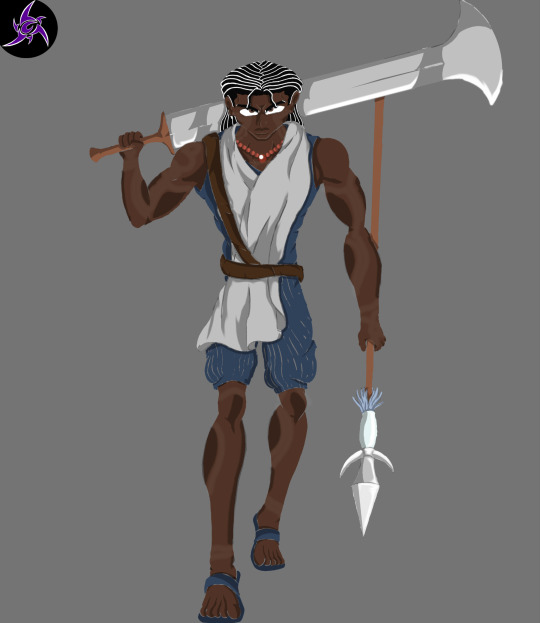
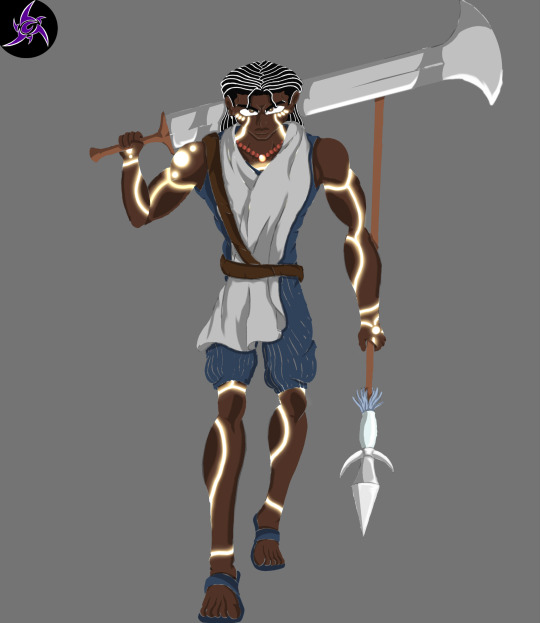
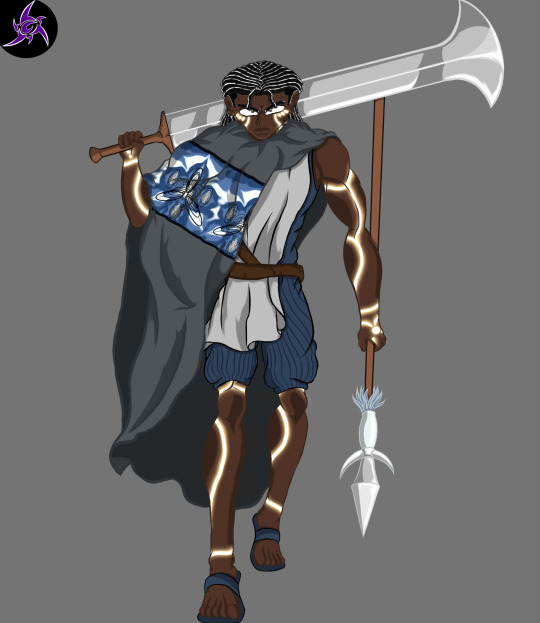
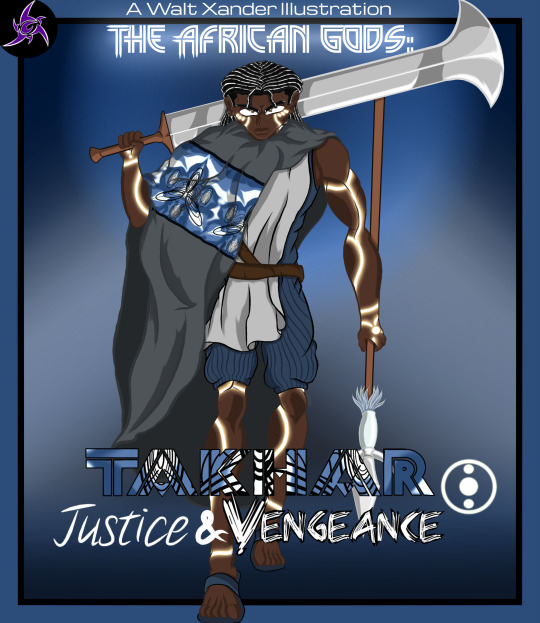
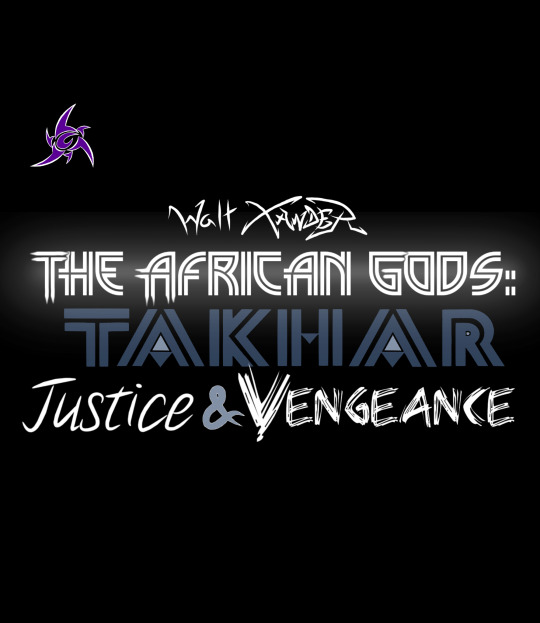
For this New Classics Challenge, I used Takhar, African God of Justice and Vengeance. Specifically, this god, a Demi-God, is from Serer Religion. And that lazy, blackwashed Aragorn was the motivator. Jeez Africa has ALOT of Gods. And that's WITHOUT counting Egypt. If all the pantheons were compared, the African Pantheon would either have the biggest roster, or be tied with the Asian Pantheon.
#New Classics Challenge#fyp#African Gods#Takhar#digital art#digital artwork#digital doodle#African Pantheon#Pantheon#Demi God#black art#dreadlocks#Gods#for you#melanin magic#God Of Justice & Vengeance#Serer Religion#Senegal#Gambia#Mauritania
0 notes
Text


Sonic Pantheon AU: Character Heights
Plus new redesigns! Had to do a seperate chart without Zeutaros because the man is just too damn big! Who allowed him to be like that?
#sonicarting#sonic pantheon au#sonic oc#sth oc#sonci the hedgehog oc#zeti#zeti oc#zeutaros the ancient zeti#désiré the jacobin pigeon#malda the african toad#boreas the megaloceros#piia the pygmy rabbit#agnes the luna moth#manas the manul
13 notes
·
View notes
Text
On September 10th we venerate Elevated Ancestor, Voodoo Queen of Louisiana, & Saint, Marie Catherine Laveau on her 222nd birthday 🎉
[for our Hoodoos of the Vodou Pantheon]

Marie Catherine Laveau was a dedicated Hoodoo, healer, herbalist, & midwife who, "traveled the streets [of New Orleans] like she owned them", as the most infamous Voodoo Queen of New Orleans.
Marie C. Laveau I was born a "Free Mulatto" in today's French Quarter in what was then, New France); to a mother & grandmother who were both born into slavery & later freed via freedom papers. It is believed that she grew up in the St. Ann Street cottage of her maternal grandmother.
She married Jacques Santiago-Paris, a "Quadroon" "Free Man of Color", who fled as a refugee from Saint-Domingue, Haiti from the Haitian Revolution in the former French colony . After his passing, she became known as "The Widow Paris". She then worked as a hairdresser catering to White families & later entered a domestic partnership with a French nobleman his death. She excelled at obtaining inside information on her wealthy patrons by instilling fear in their servants whom she either paid or cured of mysterious ailments. Although she never abandoned her Catholic roots, she became increasingly interested in her mother’s African traditional beliefs. The Widow Paris learned her craft from a ‘Voodoo doctor’ known variously as Doctor John or John Bayou.
Marie C. Laveau I is said to have intiated into Voodoo career sometime in the 1820s. She's believed to be descended from a long line of Voodoo Priestesses, all bearing her same name. She was also a lifelong devout Catholic. It didn’t take long before Marie C. Laveau I dominated New Orleans Voodoo culture & society before claiming title of Queen. She was the 3rd Voodoo Queen of NOLA - after Queen Sanité Dédé & Queen Marie Salopé. During her decades tenure, she was the premier beacon of hope and service to customers seeking private consultations - to aid in matters such as family disputes, health, finances, etc, created/sold gris gris, perforemed exorcisms. While her daughter Marie II was known for her more theatrical displays of public events, Marie C. Laveau I was less flamboyant in her persona. She conducted her work in 3 primary locations throughout the city: her home on St. Ann Street, Congo Square, & at Lake Pontchartrain. Despite one account of a challenge to her authority in 1850, Marie C. Laveau I maintained her leadership & influence.
The Queen died peacefully in her sleep in her ole cottage home on St. Ann Street. Her funeral was conducted according to the rite of the Catholic Church & in the absence of any Voodoo rites. To her Voodoo followers, she's venerated as a Folk Saint. In² addition to her Priesthood in Voodoo and title of Queen, she is also remembered for her community activism; visiting prisoners, providing lessons to women of the community, & doing ritual work for those in need.
She is generally believed to have been buried in plot 347, the Glapion family crypt in Saint Louis Cemetery No. 1, New Orleans. As of March 1st, 2015, there is no longer public access to St. Louis Cemetery No. 1. Entry with a tour guide is required due to continued vandalism & tomb raiding.
We pour libations & give her💐 today as we celebrate her for her love for & service to the people, through poverty, misfortune, bondage, & beyond.
Offering suggestions: flowers + libations at her grave, catholic hymns, holy water, gold rings/bracelets, money
‼️Note: offering suggestions are just that & strictly for veneration purposes only. Never attempt to conjure up any spirit or entity without proper divination/Mediumship counsel.‼️
#hoodoo#hoodoos#atr#atrs#the hoodoo calendar#conjure#rootwork#rootworkers#ancestor veneration#Marie c Laveau#Voodoo#Voodoo Queens#new orleans#new orleans Voodoo#Vodou Pantheon#Haitian Voodou
365 notes
·
View notes